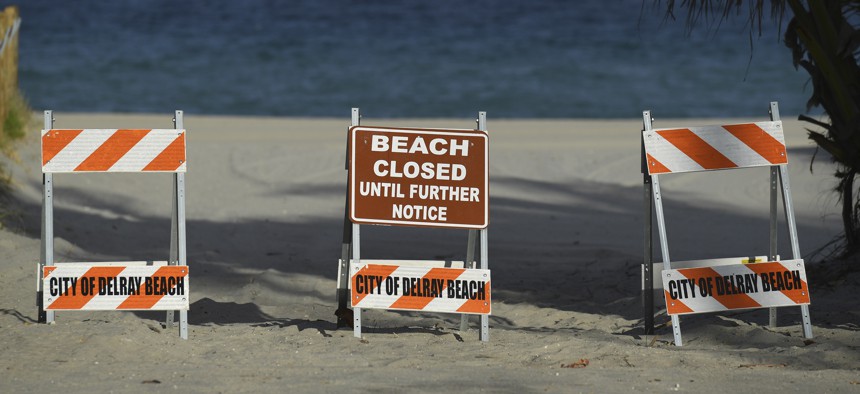Stay-At-Home Scofflaws Face Fines, Arrest for Social Distancing Failures

A general view of Delray Beach as the beach is closed in response due to the Coronavirus (COVID-19) pandemic on March 23, 2020 in Delray Beach Florida. mpi04/MediaPunch

Connecting state and local government leaders
Local authorities are beginning to crack down on those who blatantly violate orders banning large public gatherings, while trying to make it harder for people to break the rules in public spaces like parks.
From a few arrests to $500 fines, local authorities are beginning to crack down on large gatherings as some residents flout city and state orders banning gatherings and requiring people to stay home in order to control spread of the coronavirus.
A Pentecostal pastor in Florida was arrested Monday after holding two large church services on Sunday—even offering bus transportation for congregants—after he was warned by local law enforcement not to go through with the services.
Rodney Howard-Browne, the pastor at the River at Tampa Bay Church, will face misdemeanor charges for unlawful assembly and violation of public health emergency rules, said Hillsborough County Sheriff Chad Chronister.
"His reckless disregard for human life put hundreds of people in his congregation at risk and thousands of residents who may interact with them this week in danger," Chronister said.
No one at the church answered the phone Monday. But a previous post on the church’s Facebook page indicated that leaders felt it was important to stay open during a time of crisis and that the church had made extra efforts to clean and sanitize surfaces inside the building.
“We feel that it is very important, at this time, that we keep our doors open for anyone who needs prayer or ministry and to make ourselves available to minister hope and healing and comfort to them,” the post read.
Hillsborough County issued an administrative order last week that bans public or private gatherings, including faith-based activities, with more than 10 people present.
State and local authorities have taken a variety of approaches to stop people from congregating in groups both large and small—including reducing amenities at public parks and fining violators.
In New York City, where police over the weekend made their first arrest of a bar owner operating illegally since the city went on lockdown, Mayor Bill de Blasio emphasized that residents had received more than enough warnings to stay home and should know better by now than to go out. He said Sunday that police will begin issuing fines ranging from $250 to $500 to people who disregard orders to break up large social gatherings.
"They're going to give people every chance to listen,” de Blasio said of police enforcing the orders. “But if they haven't gotten the message by now and they don't get the message when an enforcement officer's staring them in the face… that person then deserves the fine.”
Over the weekend, authorities in Maryland also made their first arrest related to violation of Gov. Larry Hogan’s emergency order banning gatherings of more than 10 people.
Charles County sheriff’s deputies arrested Shawn Myers after authorities responded to his home for reports of a large party. Authorities said more than 60 people were gathered for a bonfire and Myers refused orders from officers to disperse the crowd.
Hogan issued a stay-at-home order that takes effect Monday night, warning residents that violators could be punished by up to a year in prison and a $5,000 fine.
“We are no longer asking or suggesting that Marylanders stay home, we are directing them to do so,” he said.
Enforcement of stay-at-home orders has proved particularly challenging at parks and beaches. Many state orders include caveats granting residents a reprieve from their homes to exercise, and stir-crazy residents have in recent weeks taken to parks, beaches and trails in droves. To address social distancing concerns, some states are closing beaches or campgrounds, reducing park services, or stepping up patrols on public lands to prevent large gatherings.
Virginia Gov. Ralph Northam announced a stay-at-home order Monday that declared state beaches closed to the public for “all activity, except exercising and fishing.”
State parks in Michigan remain open, but the Department of Natural Resources closed public bathrooms and other amenities, like volleyball courts, fishing piers and playgrounds “to minimize the chance of people gathering in groups.”
“No matter how people are choosing to get outdoors, it is critical that everyone follows the social distancing guidelines,” said DNR Director Dan Eichinger. “If they don’t, we will be forced to close public access to all state-managed lands.”
In Horry County, South Carolina, the police department over the weekend traversed beaches and waterways to enforce social distancing orders, instructing groups of three or more people who were not related to disperse. Police there issued 11 citations over the weekend, mostly to groups of people who went out boating together, said spokeswoman Mikayla Moskov.
"All other parties who were approached regarding distancing violations were compliant with directions to separate or disperse," she said.
Park officials in Pittsburgh said they were also busy Monday responding to residents’ blatant disregard of social distancing guidance in public spaces. The city’s parks remain open to the public, but public works officials began removing basketball rims from courts on Monday after crowds ignored social distancing guidance and gathered over the weekend to play.
To further address crowding concerns in local parks, Pittsburgh park rangers and police plan to patrol city parks, trails and playgrounds more closely, officials said.

NEXT STORY: State Legislatures Scramble to Meet in the Age of Coronavirus




